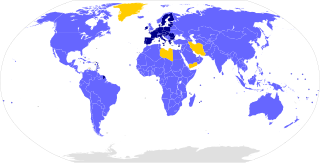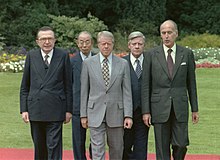The General Agreement on Tariffs and Trade (GATT) is a legal agreement between many countries, whose overall purpose was to promote international trade by reducing or eliminating trade barriers such as tariffs or quotas. According to its preamble, its purpose was the "substantial reduction of tariffs and other trade barriers and the elimination of preferences, on a reciprocal and mutually advantageous basis."

Negotiation is a dialogue between two or more parties to resolve points of difference, gain an advantage for an individual or collective, or craft outcomes to satisfy various interests. The parties aspire to agree on matters of mutual interest. The agreement can be beneficial for all or some of the parties involved. The negotiators should establish their own needs and wants while also seeking to understand the wants and needs of others involved to increase their chances of closing deals, avoiding conflicts, forming relationships with other parties, or maximizing mutual gains. Distributive negotiations, or compromises, are conducted by putting forward a position and making concessions to achieve an agreement. The degree to which the negotiating parties trust each other to implement the negotiated solution is a major factor in determining the success of a negotiation.

The World Trade Organization (WTO) is an intergovernmental organization headquartered in Geneva, Switzerland that regulates and facilitates international trade. Governments use the organization to establish, revise, and enforce the rules that govern international trade in cooperation with the United Nations System. The WTO is the world's largest international economic organization, with 164 member states representing over 98% of global trade and global GDP.

The Reciprocal Tariff Act provided for the negotiation of tariff agreements between the United States and separate nations, particularly Latin American countries. The Act served as an institutional reform intended to authorize the president to negotiate with foreign nations to reduce tariffs in return for reciprocal reductions in tariffs in the United States up to 50%. It resulted in a reduction of duties. This was the policy of the low tariff Democrats in response to the high tariff Republican program which produced the Smoot–Hawley tariff of 1930 that raised rates, and sharply reduced international trade. The Reciprocal Tariff Act was promoted heavily by Secretary of State Cordell Hull.

Foreign policy, also known as external policy, is the set of strategies and actions a state employs in its interactions with other states, unions, and international entities. It encompasses a wide range of objectives, including defense and security, economic benefits, and humanitarian assistance. The formulation of foreign policy is influenced by various factors such as domestic considerations, the behavior of other states, and geopolitical strategies. Historically, the practice of foreign policy has evolved from managing short-term crises to addressing long-term international relations, with diplomatic corps playing a crucial role in its development.
The Canada–United States Free Trade Agreement (CUSFTA), official name as the Free Trade Agreement between Canada and the United States of America, was a bilateral trade agreement reached by negotiators for Canada and the United States on October 4, 1987, and signed by the leaders of both countries on January 2, 1988. The agreement phased out a wide range of trade restrictions in stages, over a ten-year period, and resulted in a substantial increase in cross-border trade as an improvement to the last replaced trade deal. With the addition of Mexico in 1994, CUSFTA was superseded by the North American Free Trade Agreement (NAFTA).
Bilateralism is the conduct of political, economic, or cultural relations between two sovereign states. It is in contrast to unilateralism or multilateralism, which is activity by a single state or jointly by multiple states, respectively. When states recognize one another as sovereign states and agree to diplomatic relations, they create a bilateral relationship. States with bilateral ties will exchange diplomatic agents such as ambassadors to facilitate dialogues and cooperations.

The Paris Peace Accords, officially the Agreement on Ending the War and Restoring Peace in Viet Nam, was a peace agreement signed on January 27, 1973, to establish peace in Vietnam and end the Vietnam War. The agreement was signed by the governments of the Democratic Republic of Vietnam ; the Republic of Vietnam ; the United States; and the Provisional Revolutionary Government of the Republic of South Vietnam (PRG), which represented South Vietnamese communists. US ground forces had begun to withdraw from Vietnam in 1969, and had suffered from deteriorating morale during the withdrawal. By the beginning of 1972 those that remained had very little involvement in combat. The last American infantry battalions withdrew in August 1972. Most air and naval forces, and most advisers, also were gone from South Vietnam by that time, though air and naval forces not based in South Vietnam were still playing a large role in the war. The Paris Agreement removed the remaining US forces. Direct U.S. military intervention was ended, and fighting between the three remaining powers temporarily stopped for less than a day. The agreement was not ratified by the U.S. Senate.
In diplomacy and international relations, shuttle diplomacy is the action of an outside party in serving as an intermediary between principals in a dispute, without direct principal-to-principal contact. Originally and usually, the process entails successive travel ("shuttling") by the intermediary, from the working location of one principal, to that of another.

An international environmental agreement or sometimes environmental protocol, is a type of treaty binding in international law, allowing them to reach an environmental goal. In other words, it is "an intergovernmental document intended as legally binding with a primary stated purpose of preventing or managing human impacts on natural resources."
Diaspora politics in the United States is the political behavior of transnational diasporas of ethnic groups, their relationship with their ethnic homelands and their host states, as well as their role in inter-ethnic relations. This article describes case studies and theories of political scientists studying diaspora politics within the specific context of the United States. The general study of diaspora politics is part of the broader field of diaspora studies.

The Ministry of Foreign Affairs is the governmental body responsible for conducting foreign relations of the Republic of Turkey. The Ministry is responsible for Turkey's diplomatic missions abroad and for the promotion of Turkish culture, as well as for implementing the country's foreign policy in accordance with its national interests. Established on 2 May 1920, its primary duties are administering diplomatic missions, negotiating international treaties and agreements, and representing the Republic of Turkey at the United Nations. The ministry is headquartered in the Turkish capital of Ankara and counts on more than 200 missions as embassies, permanent representation offices and consulates general, abroad. As of 2021, the Ministry of Foreign Affairs maintains 235 diplomatic posts worldwide. The current Minister of Foreign Affairs is Hakan Fidan, who has held the position since 3 June 2023.
Paradiplomacy is the involvement of non-central governments in international relations. The phenomenon includes a variety of practices, from town twinning to transnational networking, decentralized cooperation, and advocacy in international summits. Following the movement of globalisation, non-central governments have been playing increasingly influential roles on the global scene, connecting across national borders and developing their own foreign policies. Regions, states, provinces and cities seek their way to promote cooperation, cultural exchanges, trade and partnership, in a large diversity of ways and objectives depending on their decentralization, cultural, and socio-economical contexts. This trend raises new questions concerning public international law and opened a debate on the global governance regime, and the evolution of the nation-led system that has provided the grounds for the international political order in the last centuries.
Constructive ambiguity is a term generally credited to Henry Kissinger, said to be the foremost exponent of the negotiating tactic it designates. It refers to the deliberate use of ambiguous language on a sensitive issue in order to advance some political purpose. Constructive ambiguity is often disparaged as fudging. It might be employed in a negotiation, both to disguise an inability to resolve a contentious issue on which the parties remain far apart and to do so in a manner that enables each to claim obtaining some concession on it.
In political ecology and environmental policy, climate governance is the diplomacy, mechanisms and response measures "aimed at steering social systems towards preventing, mitigating or adapting to the risks posed by climate change". A definitive interpretation is complicated by the wide range of political and social science traditions that are engaged in conceiving and analysing climate governance at different levels and across different arenas. In academia, climate governance has become the concern of geographers, anthropologists, economists and business studies scholars.

A commercial policy is a government's policy governing international trade. Commercial policy is an all encompassing term that is used to cover topics which involve international trade. Trade policy is often described in terms of a scale between the extremes of free trade on one side and protectionism on the other. A common commercial policy can sometimes be agreed by treaty within a customs union, as with the European Union's common commercial policy and in Mercosur. A nation's commercial policy will include and take into account the policies adopted by that nation's government while negotiating international trade. There are several factors that can affect a nation's commercial policy, all of which can affect international trade policies.

Diplomacy comprises spoken or written communication by representatives of state, intergovernmental, or nongovernmental institutions intended to influence events in the international system.

The Paris Agreement is an international treaty on climate change that was adopted in 2015. The treaty covers climate change mitigation, adaptation, and finance. The Paris Agreement was negotiated by 196 parties at the 2015 United Nations Climate Change Conference near Paris, France. As of February 2023, 195 members of the United Nations Framework Convention on Climate Change (UNFCCC) are parties to the agreement. Of the three UNFCCC member states which have not ratified the agreement, the only major emitter is Iran. The United States withdrew from the agreement in 2020, but rejoined in 2021.

The Joint Comprehensive Plan of Action, commonly known as the Iran nuclear deal or Iran deal, is an agreement on the Iranian nuclear program reached in Vienna on July 14, 2015, between Iran and the P5+1 together with the European Union.
In international relations, migration diplomacy is 'the use of diplomatic tools, processes, and procedures to manage cross-border population mobility,' including 'both the strategic use of migration flows as a means to obtain other aims, and the use of diplomatic methods to achieve goals related to migration.' Migration has come to constitute an increasingly-important area of states' engagement with one another, with bilateral multilateral strategies including the promotion or discouragement of bilateral migratory flows; agreements on preferential treatment to certain foreign nationals; the initiation of guest-worker programmes or other short-term labor migration schemes; the deportation of foreign nationals; and so on.












